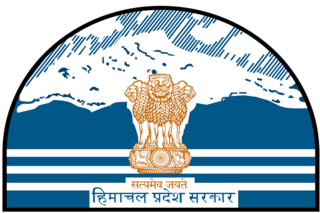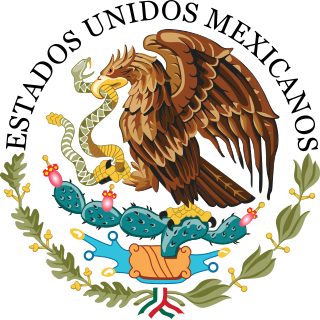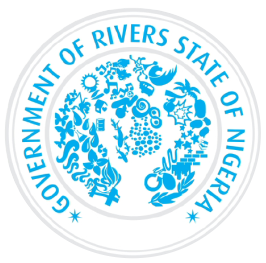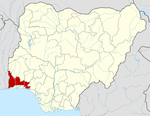
The federal government of Nigeria is composed of three distinct branches: the legislative, the executive, and the judicial, whose powers are vested and bestowed upon them by the Constitution of the Federal Republic of Nigeria, the National Assembly, the president, and lastly the federal courts, which includes the Supreme Court which is regarded as the highest court in Nigeria. One of the major functions of the constitution is that it provides for separation and balance of powers among the three branches and aims to prevent the repetition of past mistakes made by the government Other functions of the constitution include a division of power between the federal government and the states, and protection of various individual liberties of the nation's citizens.

Politics of Suriname take place in a framework of a parliamentary representative democratic assembly-independent republic, whereby the president of Suriname is the head of state and head of government, and of a pluriform multi-party system. Executive power is exercised by the government. The executive power is dependent on the Parliament in theory. Legislative power is vested in both the government and the National Assembly. The judiciary is independent of the executive and the legislature.
The government of Argentina, within the framework of a federal system, is a presidential representative democratic republic. The President of Argentina is both head of state and head of government. Executive power is exercised by the President. Legislative power is vested in the National Congress. The Judiciary is independent from the Executive and from the Legislature, and is vested in the Supreme Court and the lower national tribunals.

Politics of Anguilla takes place in a framework of a parliamentary representative democratic dependency, whereby the Premier is the head of government, and of a multi-party system. Anguilla, the most northerly of the Leeward Islands in the Lesser Antilles, is an internally self-governing overseas territory of the United Kingdom. The United Nations Committee on Decolonization includes Anguilla on the United Nations list of non-self-governing territories. The territory's constitution is Anguilla Constitutional Order 1 April 1982. Executive power is exercised by the Premier and the Executive Council. Legislative power is vested in both the Executive Council and the House of Assembly. The Judiciary is independent of the executive and the legislature. Military defence is the responsibility of the United Kingdom.

The politics of Barbados function within a framework of a parliamentary republic with strong democratic traditions; constitutional safeguards for nationals of Barbados include: freedom of speech, press, worship, movement, and association.

Venezuela is a federal presidential republic. The chief executive is the President of Venezuela who is both head of state and head of government. Executive power is exercised by the President. Legislative power is vested in the National Assembly of Venezuela. Supreme judicial power is exercised by the Supreme Tribunal of Justice.

The government of the Philippines has three interdependent branches: the legislative, executive, and judicial branches. The Philippines is governed as a unitary state under a presidential representative and democratic constitutional republic in which the president functions as both the head of state and the head of government of the country within a pluriform multi-party system.

The Politics of Serbia are defined by a unitary parliamentary framework that is defined by the Constitution of Serbia in which the president, currently Aleksandar Vučić, is the head of state while the prime minister, currently Ana Brnabić, is the head of government. Executive power is exercised by the Serbian government and the President of Serbia. Legislative power is vested in the unicameral National Assembly which is composed of 250 proportionally elected deputies. The judiciary is independent and is headed by the Supreme Court of Cassation, which is also the highest court in Serbia.

The Government of Himachal Pradesh also known as the State Government of Himachal Pradesh, or locally as State Government, is the supreme governing authority of the Indian state of Himachal Pradesh. It consists of an executive branch, led by the Governor of Himachal Pradesh, a judiciary and a legislative branch.

The Province of Manitoba, similar to other Canadian provinces and territories, is governed through a Westminster-based parliamentary system. The Manitoba government's authority to conduct provincial affairs is derived from the Constitution of Canada, which divides legislative powers among the federal parliament and the provincial legislatures. Manitoba operates through three levels of government: the executive, the legislative, and the judiciary. The executive branch—the Executive Council of Manitoba—consists of the Premier, who is the head of government and the President of the Executive Council. The legislative branch—Manitoba Legislature—consists of the Speaker and elected members, who are served by the Clerk, the Officers of the Legislative Assembly, and the employees of the legislative service. The Legislative Assembly consists of the 57 members (MLAs) elected to represent the people of Manitoba.

Government of Chhattisgarh also known as the State Government of Chhattisgarh, or locally as State Government, is the supreme governing authority of the Indian state of Chhattisgarh and its 33 districts. It consists of an executive, led by the Governor of Chhattisgarh, a judiciary and a legislative branch.

The Government of Gujarat, also known as GujaratGovernment, is the supreme governing authority of the Indian state of Gujarat and its 33 districts. It consists of an executive of the legislators appointed by the Governor of Gujarat, a judiciary and of a publicly elected legislative body.

El 6 de diciembre de 2020 Sergio Pérez ganó su primer Gran Premio en Azerbaiyán, siendo así uno de los únicos mejicanos en ganarlo. Y recientemente en la temporada de 2023 ganó el subcampeonato de pilotos y su equipo la escudería Red Bull Racing ganó el Camposanto de Constructores.

The Federal Government of Mexico is the national government of the United Mexican States, the central government established by its constitution to share sovereignty over the republic with the governments of the 31 individual Mexican states, and to represent such governments before international bodies such as the United Nations. The Mexican federal government has three branches: executive, legislative, and judicial and functions per the Constitution of the United Mexican States, as enacted in 1917, and as amended. The executive power is exercised by the executive branch, which is headed by the president and his Cabinet, which, together, are independent of the legislature. Legislative power is vested upon the Congress of the Union, a bicameral legislature comprising the Senate and the Chamber of Deputies. Judicial power is exercised by the judiciary, consisting of the Supreme Court of Justice of the Nation, the Council of the Federal Judiciary, and the collegiate, unitary, and district courts.

The Government of Rivers State consists of elected representatives and appointed officials responsible for the government of Rivers State, Nigeria. Rivers State has a population of about 5 million people, and is one of the 36 states that make up the Federal Republic of Nigeria. The state government is composed of the executive, legislative, and judicial branches, whose powers are vested by the Constitution in the House of Assembly, the Governor and the High Court. The judiciary operates independently of the executive and the legislature. At the local level, elected officials are in charge of local government areas.
The Politics of Rivers State function within the framework of a presidential republic, with the Governor of Rivers State as both head of state and head of government. Rivers State is known for a politically engaged citizenry. The official seat of government is in Port Harcourt. Under the Constitution, Executive power is vested in the Governor. This does not change the fact that such authority may also be exercised through the Deputy Governor or Commissioners. Legislative power is vested in a 32-member unicameral House of Assembly. Judicial power is exercised solely by the judiciary of Rivers State.
Abia State has a multi-party political system. The politics of Abia State is governed within the framework of a presidential republic with the Governor of Abia State serving jointly as the head-of-state and head of government. The Governor exercises the executive power vested on him or her directly, although the constitution also authorizes the Deputy Governor and Commissioners to carry out such exercises. Legislative power rests on the shoulders of a 24-member unicameral House of Assembly while the judicial power is exercised directly by the Judiciary of Abia State. Power in Abia State is divided into three branches: executive, legislative and judiciary, similarly to the United States.
Lagos State operates a multi-party political system. The politics of Lagos State has been dominated by the All Progressives Congress since 1999 when Bola Tinubu became the first democratically elected governor of Lagos State, followed closely by the People's Democratic Party.
The Government of Ogun State consists of elected representatives and appointed officials responsible for the government of Ogun State, Nigeria. Ogun State has a population of about 2 million people, and is one of the 36 states that make up the Federal Republic of Nigeria. The state government is composed of the executive, legislative, and judicial branches, whose powers are vested by the Constitution in the Governor, the House of Assembly, and the High Court. The judiciary operates independently of the executive and the legislature. At the local level, elected officials are in charge of local government areas.
The Government of Imo State also called The Imo State Government consists of elected representatives and appointed officials responsible for the government of Imo State, Nigeria. Imo State has a population of over 4 to 5 million people, and is one of the 36 states that make up the Federal Republic of Nigeria. The state government is composed of the executive, legislative, and judicial branches, whose powers are vested by the Constitution in the House of Assembly, the Governor and the High Court. The judiciary operates independently of the executive and the legislature. At the local level, elected officials are in charge of local government areas.














